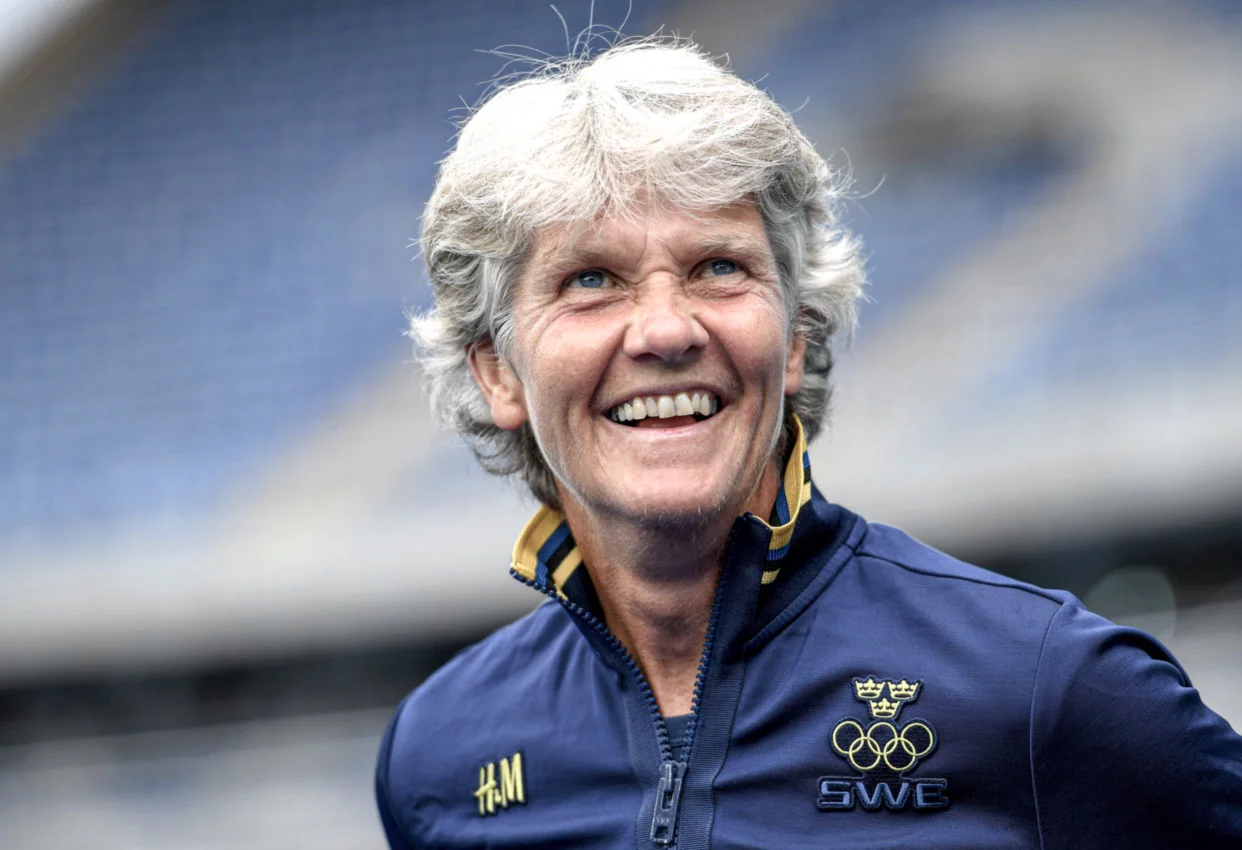Pia Sundhage, Swedish football manager and former professional player, became the first female player to score within an international match at Wembley. In April 2024, the national Swedish team made their return to play at the stadium after 35 years, and they now come up against the English side in the race for 2025 Euros qualification.
In 1989, Sweden’s women’s national football team faced England in an international friendly at Wembley. With two goals scored by Pia Sundhage and Lena Videkull, Sweden gained a 2-0 win over England. The match brought together a total of 3,150 spectators, and Sundhage became the first female to score in an international match at Wembley Stadium.
However this hidden historical treasure of a game showed the reality for females playing football. When speaking to a journalist, Sundhage explained the unfair conditions that the teams had to experience due to the lack of respect towards women’s football at the time.
She stated:
“We couldn’t use the correct locker rooms. The women’s match was nothing compared to ‘real’ football. I also remember we were not allowed to practise on the field.”
“But it was a little bit of a statement, the fact that we got the chance to play at Wembley.”
Currently, women’s football is growing more each and every day, however it is important to note the matches and events that have been hidden in the history of women’s football.
Pia Sundhage covers this:
“It’s really hard to describe how it was then compared to what is happening now.”
The respect for the women’s game has grown massively as a result of the 2022 Women’s Euros, but at the same time remains many factors that need to be improved on.
In April 2024, the two sides faced each other again at Wembley; 35 years after Sundhage wrote her name in the history books. The attendance tallied to an impressive 63,248, over 20 times more than the previous game in 1989.
In 1984, Sweden became the first women’s team to win the European Championship, after winning a two-leg final against England in a penalty shoot-out. 40 years on and despite Sweden’s remarkable levels of consistency within major competitions, they have failed to win another major international championship. However, they have come close in multiple instances, with the team finishing third in the Women’s World Cup 2023 and also previously winning bronze in 1991, 2011 and 2019. On three occasions, they have reached the finalof the UEFA Women’s European Championships: 1987, 1995 and 2001.
In the 2022 Women’s Euros, Sweden finished first place within their group stage, going on to beat Belgium 1-0 in the quarter finals. That led them to the semi-final, where they came up against England. This match was memorable for the Lionesses’ journey to glory, as it featured Alessia Russo’s famous back-heel in the 68th minute. The game ended in a 4-0 loss for Sweden.
The Swedish team currently find themselves in a tough position, as they stand within a group alongside England, France and Ireland in the race to qualify for the 2025 Women’s Euros. Only the top two will be guaranteed their place in next year’s European championship.
Magdalena Eriksson, former Chelsea captain, holds experience playing in the Women’s Super League but also holds notable international experience. The 30 year old currently plays within the Frauen-Bundesliga side Bayern Munich, and has appeared in multiple crucial games for the Swedish side, including the semi-final of the Women’s Euros 2022 against England.
She explained:
“Actually didn’t know about that story, I’ve not heard about it before. It’s really inspiring to watch the documentary ‘Copa 71’.”
Going on to discuss:
“What a long way we’ve come with women’s football and how not so long ago, how different it was.”
Eriksson appeared for Chelsea in the Women’s FA Cup final 2023 against Manchester United. The game at Wembley produced a sold out crowd, and so Eriksson mentions that she was so “humble that we get to be a part of it”, referring to the growth of the women’s game witnessing major stadiums and matches providing sold-out crowds.
The remarkable history of the Swedish Women’s National football team just shows the significant growth in respect and understanding of women’s football. However, there is still a long way to go, and one of the most important things that needs to happen for the game to continue to grow is highlighting inspiring stories like this one, to ensure that the legacy of the female game is never forgotten.
Photo: https://www.google.com/url?sa=i&url=https%3A%2F%2Fencrypted-tbn1.gstatic.com%2Flicensed-image%3Fq%3Dtbn%3AANd9GcR8vI-Mk98yQmk5s8-zV-3RzaHAwbCMHtxQEsjCvgUnShhiaAJxI2DG3B0K2JiRCGrQm4pP-4CSEKRRYQM&psig=AOvVaw02dXCdH35KRORP0sTRA3tn&ust=1722427657765000&source=images&cd=vfe&opi=89978449&ved=0CBAQjhxqFwoTCPClzrvezocDFQAAAAAdAAAAABAE



